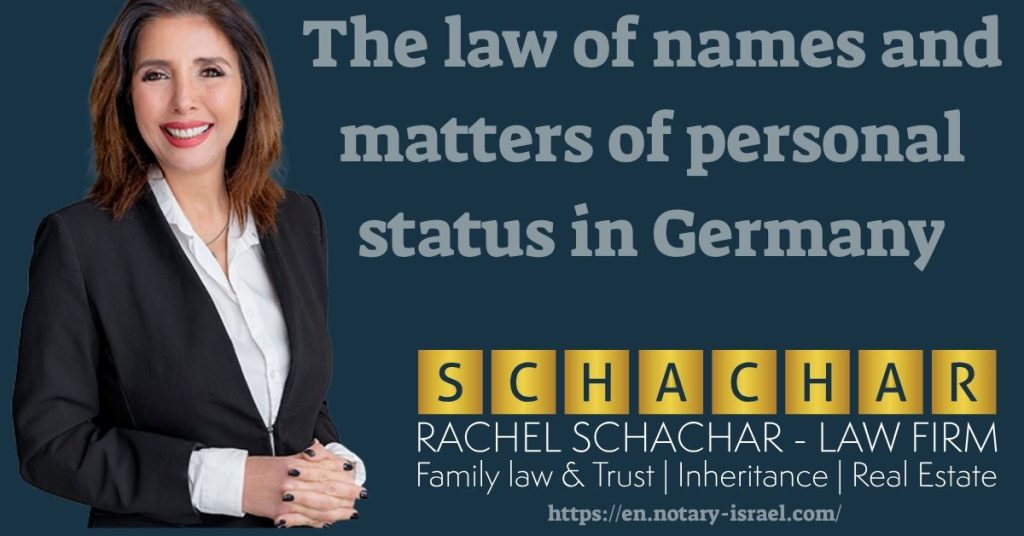A foreign citizen – to whom the German law regarding the financial and legal conditions for entering into a marriage alliance does not apply – can marry in Germany only if he presents a certificate from the interior authority in his homeland, that according to the laws of his country there is no reason to enter into the marriage alliance (certificate of suitability for marriage – in Israel a certificate of celibacy) or if he is dismissed by a president The Supreme Court in the state of the district, in which he is located, from the presentation of a certificate of “fitness to marry”.
The validity of the certificate of “fitness to marry” and the validity of the exemption from presenting the certificate of “fitness to marry” have expired, if the wedding was not held within six months of the issuance of the “fitness to marry” certificate or the granting of the exemption. If the certificate specifies a shorter date for the validity of the certificate, then this is the determining date.
Certificate of eligibility for marriage for the purpose of marriage of German citizens before authorities in a foreign country (see section 39 of the Personal Status Act in Germany)
When a German citizen wants to marry in a foreign country and needs to present a German “fitness to marry” certificate for that purpose, he must contact the Population Registry Office (Standesamt) at his permanent place of residence in Germany or his official (last) place of address in Germany, as an authority to issue a “fitness to marry” certificate.
If the person about to be married has never lived in Germany and had no permanent official address there, the Berlin Population Registry Office (Standesamt-I) will be considered responsible for issuing a certificate of “eligibility for marriage”. “Eligibility for marriage” certificates are issued in a multilingual version only and are valid for a period of six months from the date of their issuance.
Information about the necessary documents can be obtained from the Bureau for Population Registration (Standesamt), which is the authorized body.
Consular “fitness to marry” certificates cannot be issued to German citizens through an embassy.

| Topic | Information |
| Marriage Eligibility in Germany | – Foreign citizens must present a certificate of eligibility to marry or obtain an exemption. |
| – Exemptions can be granted by the Supreme Court of the district. | |
| Validity of Eligibility Certificate | – The certificate is valid for six months unless a shorter validity period is specified. |
| – Marriage must occur within the certificate’s validity period. | |
| Foreign Citizens Marrying in Germany | – German citizens marrying in a foreign country must obtain a “fitness to marry” certificate. |
| – The certificate is issued by the Population Registry Office in Germany. | |
| – Certificates are multilingual and valid for six months. | |
| Marriage in Israel | – Israel only recognizes religious marriages, and Jewish spouses are under the responsibility of the Rabbinate. |
| – Different religious communities may have their own rules regarding marriage. | |
| – Spouses from recognized communities can marry according to their religious laws. | |
| Non-Religious Partnership in Israel | – As of September 25, 2010, non-religious partnerships provide rights similar to marriage for couples without religion. |
| – Partnerships can be registered in the marriage registry. | |
| Application for Documentation of Foreign Marriages | – German citizens can register foreign marriages in the German marriage registry. |
| – The German embassy can assist when at least one spouse is a German citizen within the embassy’s jurisdiction. | |
| – Documentation is handled by the Population Registry Office in Germany. |
Marriage in Germany
In principle, you can get married in Germany only before an official of the Population Registry Office. When you want to get married in Germany before an official at the Population Registry Office, you must notify in advance of your intention to marry at the authorized Standesamt.
The authorized party for registration is the clerk at the Population Registry Office at the place of residence. If the couple lives in different places or has several registered residential addresses, they have the right to choose the Population Registry Office themselves. The marriage ceremony itself can be performed at any population registry office in Germany. After the marriage eligibility check, the population registry office, where the wedding is supposed to take place, will receive the necessary documents to continue the process.
If neither of the spouses has a permanent place of residence or a registered address within the borders of the Federal Republic of Germany, the marriage must be registered at the population registry office where the wedding is planned. You can choose any population registry office in Germany for this purpose.
Please contact directly the Population Registry office authorized to handle your case in order to obtain the necessary documents for marriage registration.
Marriage in Israel
In Israel there are no civil weddings, only religious marriages. In matters of marriage, Jewish spouses are under the responsibility of the Rabbinate. Rabbis are forbidden to perform weddings between Jews and non-Jews.
If the couple belong to different religions, they cannot marry in Israel. In these cases, many choose to conduct the marriage in countries such as Cyprus, Denmark, the USA and others.
The Catholic Church belongs to the religious communities recognized by the state. This statement is not true for all Protestant Christians. Despite this, it is possible for spouses from these communities to marry before a clergyman in their community, according to their religious laws. Despite their community status, these marriages are recognized by State of Israel.
The German Embassy in Israel cannot perform marriages.
All marriages conducted in Israel are confirmed on a uniform form issued by the Ministry of the Interior. In the case of the marriage of foreign citizens, a confirmation (issued through the Israeli Ministry of Foreign Affairs) with an Apostille stamp is necessary, so that the official of the Population Registry Office in Germany can recognize this marriage.
The marriage can be performed at the Redeemer Evangelical-Lutheran Church or at the Dormition Catholic Church (both churches are in Jerusalem). To find out the necessary documents, please contact the churches directly.
Relationship without religion in Israel
As of September 25, 2010, couples in Israel can enter into a “non-religious partnership” that gives them a similar status to marriage. Spouses without religion who agree to enter into a partnership between their sons, may register a partnership in the marriage registry. The spouses have the same rights as married couples.

| Documents Required | Information |
| Confirmation of the Marriage Contract | – Required for marriage registration. |
| Confirmation of the Spouse’s Citizenship | – Proof of the spouse’s citizenship, such as a certified copy of a passport or citizenship certificate. |
| Proof of Origin (e.g., Birth Certificate) | – Proof of origin, such as a birth certificate. |
| Name Declaration After Marriage | – In Germany, there is no automatic common surname after marriage; a name declaration is required. |
| Previous Marriage Documentation | – If either spouse was previously married, provide marriage certificates and termination proof. |
| Notarized Translations | – All non-German documents must have notarized translations into German. |
Application of German citizens for documentation and registration of marriages performed in a foreign country
When a German citizen marries in a foreign country and the marriage is valid in the German jurisdiction (see Article 11, paragraph I, Article 13, paragraph I in the law book – EGBEG) they can be registered and documented in the German marriage registry upon application submitted in this regard. Submitting the application is conditional on holding German citizenship.
The embassy can assist in receiving the application for registration and documentation of marriages held in a foreign country in the German marriage registry when at least one of the spouses is a German citizen whose permanent residence is within the jurisdiction of the embassy.
The authority authorized to register and document marriages held in a foreign country, in the marriage registry, is the Population Registry office (Standesamt) in the jurisdiction where the applicant resides/recently resided permanently in Germany. In the event that the person submitting the application did not/does not reside in Germany, the Population Registry Office in Berlin will be considered the authorized body
The right to apply
Married couples are eligible to apply. There is no need to submit a joint application, each spouse can submit the application for documentation without the consent of the other spouse.
Documents and certificates to be attached
The above list is the result of accumulated experience and is not final. If necessary, the Bureau of Population Registration may require that additional documents be found. All documents that are not in German must be accompanied by a notarized translation into German. Bilingual certificates / birth certificates (Hebrew-English) can be submitted. Certain bureaus may additionally require certificates and documents translated by a notary.
- Confirmation of the marriage contract (for example, a marriage certificate)
- Confirmation of the citizenship of the spouse (for example, a certified copy of a passport or citizenship certificate). If one of the spouses is not a citizen by birth, a citizenship certificate with a certified copy must be attached.
- Proof of origin (e.g. birth certificate)
- If relevant, confirmation of the name chosen in marriage
If one of the spouses was previously married:
- Marriage certificates of all previous marriages
- Confirmation of the termination of the previous marriage (for example, death certificate, divorce decree).
In November 2017, the powers in Germany changed. The relevant Bureau of Population Registration may require other or additional documents. For example, sometimes an apostille stamp will be required on documents from other countries, or the translation of documents must be done by a certified translator into the German language recognized by courts and authorities in Germany.
We recommend that you contact the authorized population registration office in advance to find out about these issues.
You are requested to contact the embassy at a later date to examine whether and which documents you must present in addition.
To contact the embassy, fill out the form below and send it to the email address indicated on the form. It is recommended to scan the marriage certificate and attach it to the application, as well as indicate that you wish to document / register your marriage.
costs
At the embassy:
The costs must be paid during the meeting in cash and shekels
Verification of signatures (general): about NIS 220 per request
Signature verification (for name declaration): about NIS 305 per request
Verification of copies (regardless of the number of pages in the document): about NIS 105
The above amounts are determined according to the Euro/Shekel exchange rate, so they may change slightly.
Costs at the Population Registration Office in Germany (Standesamt)
The costs in Germany are determined by the responsible registry office. They amount to about
Name statements: €12
Marriage registration: 60 – 160 euros
Birth registration: €80-172
Declaration of surname after marriage
Since the reform of the German Names Act in 1994, even in the German jurisdiction, there is no longer an automatic determination of a common surname in the case of marriage. For this purpose, a special declaration must be submitted.
A couple who got married in Israel should pay attention to the fact that in the case of choosing two surnames together for one of the spouses, no surname is created after the marriage. In the German jurisdiction, the spouses have different surnames, so a name declaration must be provided in this regard.
Both spouses must personally come to the embassy in order to submit a name declaration.
We will gladly find out what documents you need to bring with you.
You can send a fax (to the number 03-6931-394) or an email in English or German through the contact form.
Only after checking the documents and after receiving a notification on our behalf, will it be possible to make an appointment.

| Service | Cost (Approximate) |
| Verification of Signatures (General) | Around NIS 220 per request (at the embassy). |
| Signature Verification (Name Declaration) | Around NIS 305 per request (at the embassy). |
| Verification of Copies (Per Document) | Around NIS 105 (at the embassy). |
| Marriage Registration (in Germany) | Varies, typically between 60-160 euros. |
| Birth Registration (in Germany) | Varies, typically between €80-172. |
| Name Declaration Service (at the embassy) | Contact the embassy for details. |
costs
At the embassy:
The costs must be paid during the meeting in cash and shekels
Verification of signatures (general): about NIS 220 per request
Signature verification (for name declaration): about NIS 305 per request
Verification of copies (regardless of the number of pages in the document): about NIS 105
The above amounts are determined according to the Euro/Shekel exchange rate, so they may change slightly.
Costs at the Population Registration Office in Germany (Standesamt)
The costs in Germany are determined by the responsible registry office. They amount to about
Name statements: €12
Marriage registration: 60 – 160 euros
Birth registration: €80-172
validity of the statement
The statement provided will be sent by the embassy to the authorized population registry office in Germany. The declaration will come into effect only after it is received there. Therefore, for example, it is possible to issue a passport with the new name only after the embassy receives appropriate approval from the Population Registry Office.
Birth and naming
Application for documenting and registering the birth of a German citizen in a foreign country
When a German citizen is born in a foreign country, an application can be submitted to register the event in the birth registry of the Population Registry Office authorized according to the jurisdiction. The date of submission of the application is essential regarding the possession of German citizenship.
The application can be submitted at any time and its submission is not limited in time.
The application for documenting and registering the birth of a German citizen can be submitted at the embassy, if the birth took place in a foreign country and if the applicant’s permanent residence is within the jurisdiction of the embassy.
The applicant can also contact the authorized population registry office directly to submit his application for registration.
Which population registry office is authorized to register a birth?
To register a birth, the population registry office that is in the jurisdiction where the citizen born in a foreign country lives or stays permanently is usually authorized or, alternatively, where he lived or stayed permanently in the past.
If, according to this principle, it is not possible to determine a jurisdiction, the authority to register the birth will be transferred to the Population Registry office in whose jurisdiction the applicant resides or resides permanently or alternatively where he resided or resided permanently in the past.
If according to this principle it is not possible to determine a jurisdiction, the authority to handle the application for birth registration will be transferred to the Population Registry Office (I Standesamt) in Berlin.
In the case of two parents with joint custody, when only one of them holds or has held a place of residence in Germany, this will be the figure that determines the office that has the authority to handle the request. When the child is in the custody of only one parent, the authority to handle the request will be determined according to the place of residence of the parent in whose custody the child is and will be transferred to the Population Registry office in whose jurisdiction the place of residence is or was.

| Topic | Information |
| Birth Registration Process | – German citizens born abroad can apply for registration of their birth in the birth registry of the authorized Population Registry Office. |
| Application Submission | – Applications can be submitted at any time and have no time limit. |
| Where to Submit Applications | – Applications can be submitted at the German embassy if the birth occurred abroad, and the applicant’s permanent residence is within the embassy’s jurisdiction. |
| Authorized Population Registry Office | – The authorized office is usually based on the jurisdiction where the citizen was born or stayed permanently. |
| Determining Jurisdiction | – If it’s not possible to determine jurisdiction, the authority is transferred to the Population Registry Office where the applicant resides or resided permanently. |
| Right to Submit Application | – The right to submit an application rests with the child’s parents, the child, the child’s partner, or children. There’s no priority in the right to apply. |
| Required Documents | – A list of documents, including birth confirmation, marriage certificates (if applicable), citizenship proof, and name choice confirmation. |
| Costs | – Costs are determined by the Population Registry Office in Germany and may vary. |
| Declaration of Child’s Surname | – Parents and children above 14 must visit the embassy to declare the child’s surname. Foreign law options are available. |
The right to submit an application
In the event of a birth, the right to submit an application for birth registration rests with the child’s parents (the father or mother can submit the application individually), the child whose birth is in question, his or her partner (the last) or his children. There is no priority in the right to submit the application.
In the case of an adopted child, only the adoptive parents can submit the application as the child’s parents. As for submitting the application for a parent, this is the right of both biological children and adopted children.
Other descendants, such as grandchildren, do not have the right to submit the application.
Documents and certificates that need to be attached
You are requested to contact the embassy at a later date, before making an appointment, in order to check which documents you must present.
To do this, fill out the attached form below and send it to the email address that appears in it.
The following documents are usually required. The above list is the fruit of the accumulated experience and is not a final list.
If necessary, the Bureau of Population Registration may require the submission of additional documents. All documents written in a foreign language must be submitted with a notarized translation. Under certain circumstances the Population Registry Office accepts bilingual Hebrew-English (birth) certificates.
- Confirmation of the child’s birth (usually the child’s birth certificate)
- In the case of a child born to parents who are married to each other: birth certificates and confirmation of the parents’ marriage (birth certificates and marriage certificate or a certified copy from the marriage registry)
- In the case of a child born to parents who are not married to each other: the mother’s birth certificate, if available, a document acknowledging paternity and the father’s birth certificate, if necessary statements regarding custody – in the case of the marriage license, you must also present: a death certificate or a valid divorce court ruling Judgment, if necessary confirmation of recognition from the Directorate of Courts in Germany (Landesjustizverwaltung)
- Confirmation of the citizenship of the parents and the child (if available – such as a certified copy of the passport or citizenship certificate). If one of the persons concerned has not held German citizenship since birth, it is advisable to attach a certified copy of the appropriate citizenship certificate.
- If necessary, a statement on a name or confirmation of the choice of a particular name.
Only after checking the documents and after receiving a notification on our behalf, will it be possible to make an appointment.
costs
At the embassy:
The costs must be paid during the meeting in cash and shekels
Verification of signatures (general): about NIS 220 per request
Signature verification (for name declaration): about NIS 305 per request
Verification of copies (regardless of the number of pages in the document): about NIS 105
The above amounts are determined according to the Euro/Shekel exchange rate, so they may change slightly.
Costs at the Population Registration Office in Germany (Standesamt)
The costs in Germany are determined by the responsible registry office. They amount to about
Name statements: €12
Marriage registration: 60 – 160 euros
Birth registration: €80-172
| Service | Cost (Approximate) |
| Verification of Signatures (General) | Around NIS 220 per request (at the embassy). |
| Signature Verification (Name Declaration) | Around NIS 305 per request (at the embassy). |
| Verification of Copies (Per Document) | Around NIS 105 (at the embassy). |
| Birth Registration (in Germany) | Costs vary depending on the responsible registry office. |
| Declaration of Child’s Surname (at the embassy) | Contact the embassy for details. |
Declaration of a child’s surname
If a child does not receive a valid surname for the German jurisdiction automatically according to the provisions of the law (a surname shared by married parents or a surname of an unmarried mother at the time of birth, in whose sole custody the child is), it is necessary to decide which surname the newborn will bear from birth, before it is issued for the first time German identification document for him. This process will be completed with the delivery of the parents’ statement on the child’s last name.
Both parents, as well as children who have turned 14 years old, must personally come to the embassy in order to give a name statement. They are allowed to decide whether the child will bear the father’s surname or the mother’s as his own surname. In the event that one of the parents is a foreign citizen, there is also the option of choosing to apply the name law of the foreign country (for example: in the event that one of the parents is an Israeli citizen, the child can bear both surnames). The choice of the name law of the foreign country must be declared before the child turns 18 years old.
We will gladly find out what documents you need to bring with you.
To do this, you must fill out the attached form, sign it and send it via e-mail to the e-mail address that appears on the form.
A form for pre-checking a declaration on a surname – טופס לבדיקה מוקדמת של הצהרה על שם משפחה
You can send a fax (to the number 03-6931-394) or an email in English or German through the contact form.
Only after checking the documents and after receiving a notification on our behalf, will it be possible to make an appointment.
Request for documentation and retroactive registration of a birth in Germany
For German citizens who were born in a foreign country, it is possible to submit a request to register the birth in the birth registry at the authorized Population Registry office in Germany (Standesamt) through the embassy.
After processing the application (which will also determine the family name), the Bureau of the Population Registry (Standesamt) will issue a German birth certificate.
There is no obligation to submit a request for documentation and retroactive registration of a birth, but this will help in any further engagement with German state bodies.
In many cases, presenting a German birth certificate will be useful, especially when applying for the issuance of a German passport, because it establishes not only the name of the applicant according to German law, but also constitutes important evidence that that person indeed has German citizenship.
German citizens who have a naturalization certificate, i.e. they themselves received their citizenship through a naturalization process, usually do not derive any benefit from issuing a birth registration certificate retroactively in Germany, meaning that this step is unnecessary for them.
| Topic | Information |
| Birth Registration Process | – German citizens born abroad can apply for registration of their birth in the birth registry at the authorized Population Registry office in Germany (Standesamt) through the embassy. |
| Application Submission | – Applications can be submitted at any time and have no time limit. |
| Where to Submit Applications | – Applications can be submitted at the German embassy if the birth occurred abroad, and the applicant’s permanent residence is within the embassy’s jurisdiction. |
| Authorized Population Registry Office | – The authorized office is usually based on the jurisdiction where the citizen was born or stayed permanently. |
| Determining Jurisdiction | – Jurisdiction may be determined by residence, past residence, or other factors. |
| Right to Submit Application | – Parents, the child, the child’s partner, or children have the right to apply. There’s no priority in the right to apply. |
| Required Documents | – Documents include birth confirmation, marriage certificates (if applicable), citizenship proof, and name choice confirmation. |
| Costs | – Costs are determined by the Population Registry Office in Germany. |
Info
Please note: at the time of birth in a foreign country, children whose German parent was born after 12/31/1999 outside the borders of Germany and since the child’s birth resides permanently outside Germany, do not acquire German citizenship automatically by virtue of their birth, if they acquire foreign citizenship by virtue of their birth.
Only if the parents submit a request for documentation and retroactive registration of the birth within one year of the date of birth, the child will acquire German citizenship retroactively from the date of birth.
This rule does not apply to descendants of a German citizen who acquired his/her citizenship based on the compensation laws, Article 116 paragraph 2, sentence 1 of the German law book or Article 15 of the Citizenship Law.
For the avoidance of legal doubt, the embassy’s recommendation to all German citizens born outside the borders of Germany after 12.31.1999 is to submit an application for documentation and registration of the birth of their offspring born outside Germany immediately after their birth.
Preliminary examination (and personal consultation)
For your attention: it is mandatory to first fill out a form for a preliminary check for every application regarding personal status (such as: initial determination of a child’s name, name change after marriage or a request for documentation and retroactive registration of a birth).
Our team will give you advice as soon as possible and you will receive a code to make an appointment in the appointment system as well as individual information.

| Topic | Information |
| Purpose of Paternity Recognition | – Recognition is necessary when the child’s parents are not married at the time of birth. |
| Recognition at German Embassy | – Recognition of paternity can be done at the German Embassy, by appointment only, under specific conditions. |
| Required Documents | – Documents include birth certificate of the child’s father, passport of the child’s father, any necessary letters from welfare authorities, birth certificates of the child and mother, and passport of the child’s mother. |
| Legal Consequences of Recognition | – Recognition creates a family relationship between the father and the child. It establishes rights and obligations, including child support and inheritance rights. |
| Paternity Test Procedure | – Paternity tests for DNA markers can be conducted based on international agreements with Israel, allowing for legal cooperation. |
Acknowledgment of paternity
Recognition of paternity is only necessary if the child’s parents are not married to each other at the time of his birth. Recognition of paternity in accordance with Israeli law and with the consent of the child’s mother will be recognized in the German jurisdiction if the father and mother both signed the birth notification form at the hospital and both appear as parents on the birth certificate (or in the case of parents who are not citizens of Israel, on a live birth notification).
Paternity can be recognized according to German law (BGB Sections 1592 et seq.) also at the German Embassy – by appointment only – if the minor’s permanent residence is in Germany or if the child’s father has German citizenship. As a matter of fact, paternity can be recognized according to German law at the embassy also as a precaution in order to ensure legal validity (for example: in cases where the Israeli authorities cannot issue a certificate that both parents signed the birth notification form at the hospital). To check if this is necessary and/or possible, please contact the embassy using the “Contact” form.
The following documents must be submitted (if necessary with a notarized translation into German, if the documents are not issued in an English version):
- Birth certificate of the child’s father
- Passport of the child’s father
- If necessary, a letter from the designated welfare authorities
- Birth certificate of the minor (if available)
- Birth certificate of the child’s mother (if available)
- Passport of the child’s mother
The acknowledgment of paternity must be documented in an official public document. The child’s mother must give her consent to the recognition. Each of the parents must submit his affidavit himself, in person. It is not possible to transfer affidavits through representation by another party.
Legal consequences of the recognition of paternity
Through the recognition of paternity, a first degree family relationship is created between the father and the child.
From the moment the minor is born until he becomes an adult upon reaching the age of 18, the father is obligated to pay child support – at least at the accepted basic child support rate. The concrete amount of alimony is calculated according to steps according to the child’s age in accordance with the regulations for determining alimony rates (Regelbetragsverordnung) of the German government, which are adjusted every two years to developments in the economy.
A minor has an unlimited right to inherit his father’s estate. Rights may also arise towards the father’s relatives. If, for example, the minor is disinherited in a will, the minor may demand from the heirs the portion of the estate that is due to him according to law. The part of the obligation in the estate is half the value of the part of the estate established by law.
In principle, a minor living in Germany whose parents are not married to each other at the time of his birth will be in the custody of his mother only. Parents who are not married to each other can provide an affidavit in agreement about their joint intention to share custody of the minor and then the minor will be in joint custody of both of his parents. Even if the minor is not under joint custody, the minor has the right to maintain a regular relationship with both of his parents.
Paternity test procedure – DNA marker sampling
Germany and Israel are two countries that are signatories to the “Hague Convention Concerning the Taking of Evidence Abroad in Civil or Commercial Matters” (German law book BGBI II, from 1977, 1472).
On the basis of this agreement, requests for legal assistance (such as a blood type test for a paternity test procedure) will be conducted in the legal contract with Israel directly between the German authority and the corresponding central authority in Israel.
Address:
Ministry of Justice – Administration of the Courts International Department Legal assistance to foreign countries
22 Knafi Nesher St., P.O. 34142, Jerusalem zip code 95464
Tel: 02-6556847

| Topic | Information |
| Types of Adoption | – Differentiate between “strong” and “weak” adoption based on their impact. |
| “Strong” Adoption | – “Strong” adoption erases previous family ties and places the child with the adopting family as a biological child. |
| “Weak” Adoption | – “Weak” adoption creates a legal relationship with the adoptive parents but does not fully dissolve the previous relationship with the birth parents. |
| Adoption According to Israeli Law | – Adoption in Israel is considered “weak” adoption. It has implications for citizenship, child support, and inheritance rights. |
| Turning “Weak” Adoption into “Strong” | – “Weak” adoption under Israeli law can be converted into “strong” adoption according to German regulations, which can have different legal consequences. |
| Guidance from the German Embassy | – The German Embassy in Tel Aviv can provide advice on continuing the adoption process. |
Adoption – recognition of adoption decisions from foreign countries
Germany and Israel – signatory countries to the Hague Convention adoption agreement
Germany and Israel are among the signatories to the Hague Convention of May 29, 1993 on the Protection of Children and Cooperation in the Field of Intercountry Adoption (Hague Convention for Intercountry Adoption – HAÜ). The agreement entered into force in Germany on March 1, 2002, in Israel on June 1, 1999. The goal of the legislator was to unify and improve the processes of international adoption within the framework of the agreement and the accompanying implementation law.
What does the treaty state?
The content of the agreement refers to the following topics:
- Threshold conditions for international adoption (Article 4 of the Hague Convention on Intercountry Adoption)
- Division of duties and cooperation between government institutions (Article 6 of the Hague Convention on Intercountry Adoption)
- Conditions for recognizing and supervising adoption associations (Article 10 of the Hague Convention on Intercountry Adoption)
- International recognition of adoption (Article 23 of the Hague Convention on Intercountry Adoption)
Types of adoption
Differentiate between “strong” adoption and “weak” adoption according to their impact.
A “strong” adoption is basically the removal of the child from his previous family and his placement in the adopting family as a biological child; The family ties he had until then are erased.
A “weak” adoption does establish a legal relationship with the adoptive parents, but does not completely dissolve the previous relationship existing to the parents.
Adoption according to Israeli law
Adoption according to Israeli law is considered a weak adoption.
Mainly this has consequences for the child’s citizenship, which in this case is not transferred by the adoptive parent, for the obligation to pay child support and inheritance rights. According to the Adoption Consequences Law, there is the possibility of turning the adoption into a full adoption according to the German regulations on the subject.
The German Embassy in Tel Aviv will be happy to advise on the continuation of the process.
divorce
Recognition of a judicial decision from a foreign country in matters of marriage, recognition of divorces held outside Germany
A judgment regarding a divorce from a foreign country or divorce proceedings conducted before a court of a religious authority such as the Rabbinical Court in Israel, known as “private divorces”, must go through a process of recognition in Germany. The recognition will be given according to a request submitted in this regard. Only after a decision on the request has been made will the decision from the foreign country become legally binding in Germany. Please note, until the end of the recognition process, the marriage will be considered valid.
For your attention! “Private divorces” (that is, divorces by filing a divorce before a rabbinical court) are not valid in Germany and cannot be recognized in Germany, if both spouses were German citizens at the time of the divorce!
| Topic | Information |
| Recognition of Foreign Divorces | – Foreign divorce judgments or “private divorces” must go through a recognition process in Germany. |
| Validity of “Private Divorces” | – “Private divorces” are not valid in Germany if both spouses were German citizens at the time of divorce. |
| Competent Authority for Recognition | – Recognition decisions are made by the administration of the district court or the district court in the state of the district where one of the former spouses resides permanently. |
| Jurisdiction for New Marital Relationships | – If neither spouse resides permanently in Germany, jurisdiction is determined by the state of the district where the new marital relationship will be established. |
| Application Submission | – Applications can be submitted directly to the competent authority for recognition, typically the Senate’s legal directorate in Berlin. |
| Marriage Validity During Recognition | – Until the recognition process is complete, the marriage is considered valid. |
Where is the decision made regarding the recognition of the divorce?
The competent authority to make the decision is the administration of the district court (Landesjustizverwaltung), or a district court (Oberlandesgericht) in the state of the district where one of the former spouses resides permanently. If one of the former spouses does not live in Germany permanently, and if one of the former spouses intends to remarry or enter into a partnership, the competent authority will determine according to the state of the district in which the new marital relationship will be established. If neither of the spouses lives in Germany permanently and they do not intend to marry or enter into a partnership in Germany, the application must be submitted to the Department of Justice of the Senate in Berlin – Senatsverwaltung für Justiz in Berlin (see contact details in the margin).
Where can the application be submitted?
The request can be submitted using the form provided for this purpose, directly to the competent authority to receive the recognition decision (usually the Senate’s legal directorate in Berlin).
Form for submitting an application for recognition of divorce – in German
What documents are needed to submit the application?
When submitting an application for recognition of a divorce from a foreign country, you must use the appropriate form.
The form must be filled out completely and in principle the following documents must be attached to it (in some cases additional documents may be required, if necessary the copies can be verified at the embassy):
- A full copy or a faithful copy of the original of the judgment in the foreign country with a stamp of validity (if such exists) and, if possible, also the description of the circumstances and reasons for the court’s decision;
- a document confirming the registration in the official register in the countries where there is an attachment to the registration for the judgment to be valid;
- Photocopy of the marriage certificate of the permitted marriage;
- Proof of citizenship (for example by passport photos of the divorced couple);
- Unmediated translation into German by a qualified translator of all documents written in a foreign language (when it comes to original documents in the English language – not those translated into English – they usually avoid the requirement of a translation into German; if necessary, a certified translation into German of documents may be required later goddess);
- Confirmation of the salary / income of the applicant;
- Written power of attorney if the application is submitted by a power of attorney.
What fees should be paid?
The recognition process involves a fee. The amount of the commission will be determined between a minimum amount of 10 euros and a maximum amount of 300 euros. The amount of the commission depends on the circumstances and is determined on a case-by-case basis. The amount of the fee will be determined according to the importance of handling the matter for the involved parties, the hassle involved in the bureaucratic procedure and the financial situation of the applicant. The accepted average cost is about 155 euros.
What is the waiting time until the decision?
The period of time until the decision is received usually depends on the delivery of all the details and documents necessary to review the application. Only after submitting all of these will it be possible to conduct the final inspection and proceed to issue a decision (after paying the fee). Delays may be caused by ways of transferring documents and funds. Therefore, it is not possible to comprehensively estimate the period of time until the completion of the process (it depends on the specific case) – which will take several weeks and in some cases several months.
| Topic | Information |
| Application for Recognition | – Use the appropriate form for the application. |
| Required Documents | – Full or faithful copy of the foreign judgment with a validity stamp, document confirming registration, photocopy of the marriage certificate, proof of citizenship, and more. |
| Translation of Documents | – All documents in a foreign language must be translated into German by a qualified translator. |
| Confirmation of Salary/Income | – Proof of salary/income of the applicant may be required. |
| Written Power of Attorney | – A written power of attorney is necessary if the application is submitted by an attorney. |
| Fees for Recognition | – The recognition process involves a fee ranging from 10 to 300 euros, depending on the circumstances and the financial situation of the applicant. |
| Waiting Time for Decision | – The waiting time for a decision varies based on the completeness of documents and procedures, taking several weeks to months. |
foods
Germany and Israel are two countries that are signatories to the “Convention of the United Nations Conference on Maintenance Charges” dated June 20, 1956 (German Law Book 1-BGB from 1959, Volume II, p. 150). The purpose of the convention is to enable the enforcement of maintenance rights in an administrative way.
In the spirit of this convention and the accompanying law enacted in Germany on February 26, 1959 (Book of Laws 1-BGB, of 1959, Volume II, p. 149) and the Law on the Enforcement of Foreign Judgments in Israel, 578-1958, a person entitled to alimony can apply to the Magistrate’s Court (and in Germany to the competent Amtsgericht) and submit there the application for the enforcement of the judgment. In accordance with the convention, the application must include the following data:
- Surname, first names, address, date of birth, citizenship, hand delivery of the alimony winner and, if necessary, the name and address of his legal representative
- Surname and first name of the alimony debtor; In addition, if it is possible to bring additional details about the debtor, his residential addresses for the last five years, his date of birth, his citizenship and his hand delivery
- Details on the reasons for the alimony request and data on the type and amount of alimony requested, as well as additional relevant information such as details on the financial and family situation of the recipient and the alimony debtor.
The court (Amtsgericht) in Germany will forward the request for enforcement through the Ministry of Justice in Bonn to the competent authority in Israel (the Legal Aid Division). This authority will take all the necessary steps on behalf of the applicant, to bring about the collection of alimony. This is mainly about filing a claim for alimony, it is also possible to reach a settlement by reaching a compromise outside the walls of the court.
In case there is already a judgment on the subject, it must be attached to the request. The competent authority in Israel, which receives the appeal, will in this case submit an official request for the enforcement of the foreign judgment before the family court in Israel.
The competent authority in Israel according to the agreement is:
Ministry of Justice, Legal Aid Division
1 Hasorug St., Beit Mitzpe, Jerusalem, P.O. 1777, zip code 91017
Phone: +972-2-6211381
Fax: +972-2-6467945
Child abductions and international custody disputes
Kidnapping of minors is defined as a punishable act in section 235 of the German Penal Code (StGB). This offense is punishable by a fine or up to five years in prison.
In principle, the opening of criminal proceedings is conditional upon the submission of a request in this regard by the person whose rights as a parent have been violated. In exceptional cases, the submission of the request can be waived, among other things when the institutions in charge of the criminal proceedings assess that there is a special public interest in taking steps by an official.
All over the world, custody disputes are the responsibility of the legal system. The same is true for determining the place of residence and the witness arrangements. Therefore, in principle, the possibilities of the German embassies in foreign countries to intervene in international custody disputes are limited. It is recommended to hire the services of a lawyer in these cases.
The Hague Convention on Child Abduction
Germany and Israel are signatories to the Hague Convention of October 25, 1980 regarding the civil aspects of international child abduction (in Israel: “Hague Convention Law (Return of Abducted Children) 5591-1991”, in Germany BGBl. 1990 II S. 207).
The purpose of the convention is to protect children from the negative consequences of their illegal transfer to another country that is a signatory to the convention or their detention there. With the help of the convention, the removal of the child against the law or the keeping of the child while infringing on the right of custody of another person should be annulled.
When a child is abducted from Germany to another country that is a signatory to the treaty, the central authority in Germany will contact the central authority in that country following the request of the parent left behind, and ask for its assistance in handling the case. The Hague Convention obliges the signatory countries to act for the return of the child.

| Topic | Information |
| Kidnapping of Minors | – Kidnapping of minors is a punishable act in Germany and is subject to criminal proceedings. |
| Legal Responsibility | – Custody disputes and international custody matters are typically resolved within the legal system. |
| Limited Role of German Embassies | – German embassies have limited intervention capabilities in international custody disputes. |
| The Hague Convention on Child Abduction | – Germany and Israel are signatories to the Hague Convention on Child Abduction. |
| Methods of Treatment | – Legal procedures include requesting an interim or final judgment in a German family court or applying directly to the competent court in the foreign country. |
Methods of Treatment
Beyond that, there are two ways to take action. Depending on the details of the particular case, one should consider which of the two ways may lead to success, therefore it is recommended to decide on this while consulting with a lawyer.
- The injured parent can request an interim order or a final judgment in a German family court, which will transfer to him the sole custody and/or the determination of the sole place of residence. If there is a decision in this spirit from a German family court, perhaps with the addition of a subsequent order ordering the handover of the child, the affected parent could try to get these decisions recognized in the court of the country to which the child was brought or where the child is being held in violation of the law, and receive there a directive to carry out these orders. It should be noted that in many countries recognition and execution of decisions from other countries, given as part of an interim order, is not possible. In addition, it must be emphasized that making a valid decision in a foreign country without the intervention of a local lawyer is often extremely problematic or completely impossible.
- The injured parent can also apply directly to the competent court in the country to which the child was brought or where the child is being held in violation of the law and open legal proceedings for the custody and bringing of the child, with the aim of bringing about the handover of the child.
custody
The Federal Republic of Germany is a signatory to the Hague Convention on the Protection of Children (the convention is referred to in German by the initials KSÜ) dated 19.10.1996, which entered into force on 01.01.2011.
In accordance with Article 16 of the Convention, paragraphs 1, 2, the issue of turning custody over to the parent or alternatively terminating it is determined according to the laws of the country where the child’s permanent residence is located.
According to Germany’s view, this principle is valid, if the child’s permanent place of residence is in the country that is a signatory to the Convention on the Protection of Children, and also if his place of residence is in a country that is not a signatory to the Convention (principle of uniformity, Article 20 of the Convention).
In relation to Israel, as a country that is not a signatory to the treaty, this means that the decision on custody for a child whose permanent place of residence is in Israel, will be determined according to Israeli law and will also be valid in the German jurisdiction.
According to Israeli law, both parents have the right to custody of the child, if both are listed as parents on the child’s birth certificate.
It should be noted that Article 16 of the Convention, paragraph 3, prevents the loss of custody that has already been justified, even if the child’s permanent place of residence changes.
If according to the law in the new place of residence another person receives custody, this person will be added to the list of those entitled to custody according to Article 16, Paragraph 4 of the Convention.
We must emphasize that a declaration of custody by unmarried parents is legally valid according to German law only if the child’s permanent residence is in Germany.
Accordingly, there is no need for a custody declaration when the child’s permanent residence is established in Israel.
Birth, marriage and death certificates
Regarding the reissuance of certificates that have already been issued in the past in Germany, please contact the Population Registry Office in Germany that issued the original certificate.
| Topic | Information |
| Hague Convention on Protection of Children | – Germany is a signatory to the Hague Convention, which governs custody matters based on the child’s permanent place of residence. |
| Custody under Israeli Law | – In Israel, custody rights depend on both parents being listed on the child’s birth certificate. |
| Custody Decision Uniformity | – According to the Convention, custody decisions in Israel are valid in the German jurisdiction as well. |
| Change of Permanent Residence | – A change in the child’s permanent place of residence doesn’t lead to the loss of justified custody. |
| Custody for Unmarried Parents in Germany | – Unmarried parents’ custody declarations are valid in Germany if the child’s permanent residence is in Germany. |
| Reissuance of Certificates | – For reissuance of certificates issued in Germany, contact the Population Registry Office in Germany that issued the original certificate. |




